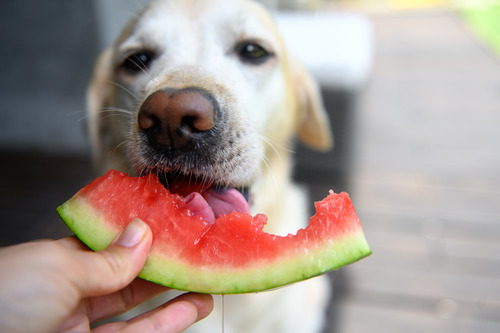Dogs have a way of making every snack look tempting, especially when you’re enjoying a juicy piece of fruit. Many pet owners wonder: can dogs eat fruit safely, or should it stay off their plate? While certain fruits provide valuable nutrients and can be a tasty treat, others can be harmful and should always be avoided. At Dix Hills Animal Hospital, our team is here to help you understand which fruits are safe and which are risky to help you make better choices for your dog’s health. This guide explores what’s safe, what’s not, and why it matters, so the next time your dog begs for a bite, you’ll know exactly how to respond.
Why Pet Owners Ask: Can Dogs Eat Fruit?
Dogs are naturally curious about human food, and fruit often smells sweet and appealing. Many fruits contain beneficial vitamins, minerals, and antioxidants that can support canine health, but that doesn’t mean all fruit is safe. The question of can dogs eat fruit matters because some fruits are perfectly fine in moderation, while others can cause digestive upset or even toxicity. Pet owners who understand these differences can feel more confident about sharing snacks and avoid worrying about potential risks.
Safe Fruits That Dogs Can Enjoy
When asked can dogs eat fruit, the answer is yes for several types of fruit, as long as they’re prepared properly and offered in moderation. Below are the most commonly recommended safe fruits for dogs.
Apples
Apples are a popular choice because they are low in fat and high in fiber. They provide vitamins A and C, which support immune health. Always remove the seeds and core before serving, as apple seeds contain trace amounts of cyanide, which can be harmful if eaten in larger quantities.
Blueberries
Blueberries are small, bite-sized treats rich in antioxidants. These berries support healthy aging and are packed with vitamin C, fiber, and phytochemicals. Their size makes them convenient for training rewards, and most dogs enjoy their mildly sweet flavor.
Bananas
Bananas are safe for dogs and contain potassium, fiber, and vitamin B6. They make a soft, easy-to-chew treat, especially for senior pets. However, bananas are naturally higher in sugar, so moderation is important.
Strawberries
Strawberries are sweet and hydrating, with vitamin C and fiber. They also contain an enzyme that may help whiten your dog’s teeth, although they should not replace dental care. Because of their sugar content, serve strawberries sparingly.
Watermelon
Seedless watermelon is refreshing and hydrating. It’s packed with vitamins A, B6, and C, along with antioxidants. Always remove seeds and the rind before serving, as both can be difficult for dogs to digest.
Other Safe Options
Dogs can also enjoy fruits like cantaloupe, pears (without seeds), raspberries, cranberries, and mango (without the pit). Each fruit offers a unique nutritional benefit, but they should all be considered treats, not meal replacements.
Fruits That Dogs Should Avoid
Just as some fruits are safe, others raise the concern: can dogs eat fruit without risk? Unfortunately, some fruits contain compounds that can harm dogs.
Grapes and Raisins
Grapes and raisins are extremely dangerous for dogs and can cause sudden kidney failure. Even a small amount may be harmful, so it’s best to keep these completely off-limits.
Cherries
Cherry pits, stems, and leaves contain cyanide, which is toxic to dogs. The pits can also cause intestinal blockages. Because the risk outweighs the benefit, cherries should be avoided altogether.
Citrus Fruits
Oranges, lemons, limes, and grapefruits contain citric acid and essential oils that can upset a dog’s stomach. While a small lick is unlikely to cause harm, offering citrus as a treat is not recommended.
Avocados
Avocados contain persin, a compound that can cause vomiting and diarrhea in dogs. The pit also poses a choking hazard. It’s best to keep avocados off your dog’s menu.
Fruits with Pits or Seeds
Even fruits that are safe in flesh form like peaches, plums, or apricots can be dangerous if a dog ingests the pits. Pits contain cyanide and can also block the digestive tract. Seeds from apples and pears carry similar concerns.
Nutritional Benefits of Fruit for Dogs
If the answer to can dogs eat fruit is yes, what exactly do they gain from it? Safe fruits offer several nutritional benefits when added to a balanced diet.
Vitamins and Antioxidants
Fruits like blueberries and strawberries provide antioxidants that support cell health and may reduce inflammation. Vitamin C helps the immune system, while vitamin A supports vision and skin health.
Fiber for Digestion
Many fruits are high in dietary fiber, which can promote healthy digestion and regularity. Apples and pears, when served without seeds, are especially good fiber sources.
Hydration Support
Fruits with high water content, like watermelon and cantaloupe, help keep dogs hydrated, especially during warm months.
Low-Calorie Treat Option
Compared to processed treats, many fruits are naturally lower in calories and fat. This makes them a good choice for weight management when used in moderation.
How to Safely Offer Fruit to Your Dog
Even with safe fruits, preparation matters. The way you introduce fruit helps answer the question can dogs eat fruit safely in real-life situations.
- Portion Control: Dogs don’t need large amounts of fruit. Treats, including fruit, should make up no more than 10% of their diet. Serving too much fruit can cause digestive upset due to natural sugars and fiber.
- Proper Preparation: Always wash fruit thoroughly to remove pesticides or residue. Remove pits, seeds, cores, and rinds before serving. Cut fruit into bite-sized pieces to prevent choking hazards.
- Watch for Allergies or Sensitivities: Just like people, dogs can have food sensitivities. Start with small portions and observe how your dog reacts before making fruit a regular treat.
Can Dogs Eat Fruit Every Day?
Many pet owners wonder if daily fruit snacks are a good idea. While safe fruits can be a healthy part of your dog’s routine, moderation is the key. Dogs thrive on a balanced diet that prioritizes high-quality protein. Fruits should be seen as occasional treats, not a substitute for their main meals. By focusing on variety and proper portions, you can safely share fruit with your pet without worrying about overindulgence.
Why Understanding Fruit Safety Matters for Dogs
When answering the question of can dogs eat fruit, pet owners have more to think about than just a dog’s interest in a snack. Knowing which fruits are safe, which to avoid, and how to serve them responsibly helps you protect your dog’s health. Safe fruits provide hydration, fiber, and essential vitamins, while harmful fruits can lead to serious health concerns. By making thoughtful choices, you can offer your dog occasional fruit treats with confidence. If you’d like more personalized guidance on your dog’s nutrition, call Dix Hills Animal Hospital at (631) 271-8383 or book an appointment online today. Our team in Huntington, NY, is happy to answer your questions and help support your pet’s health at every stage of life.





